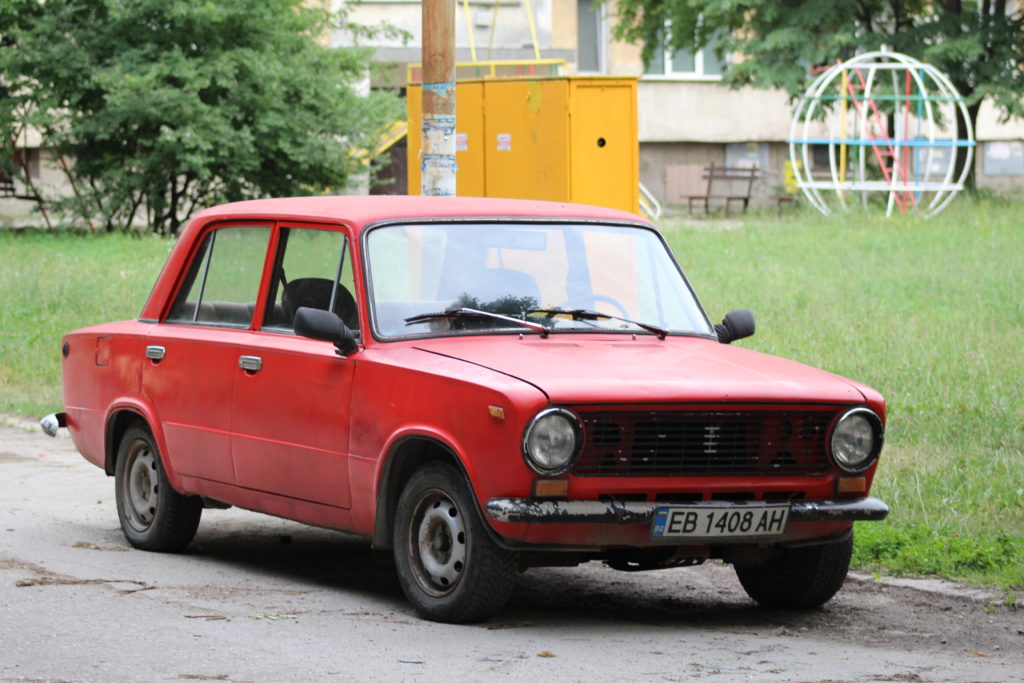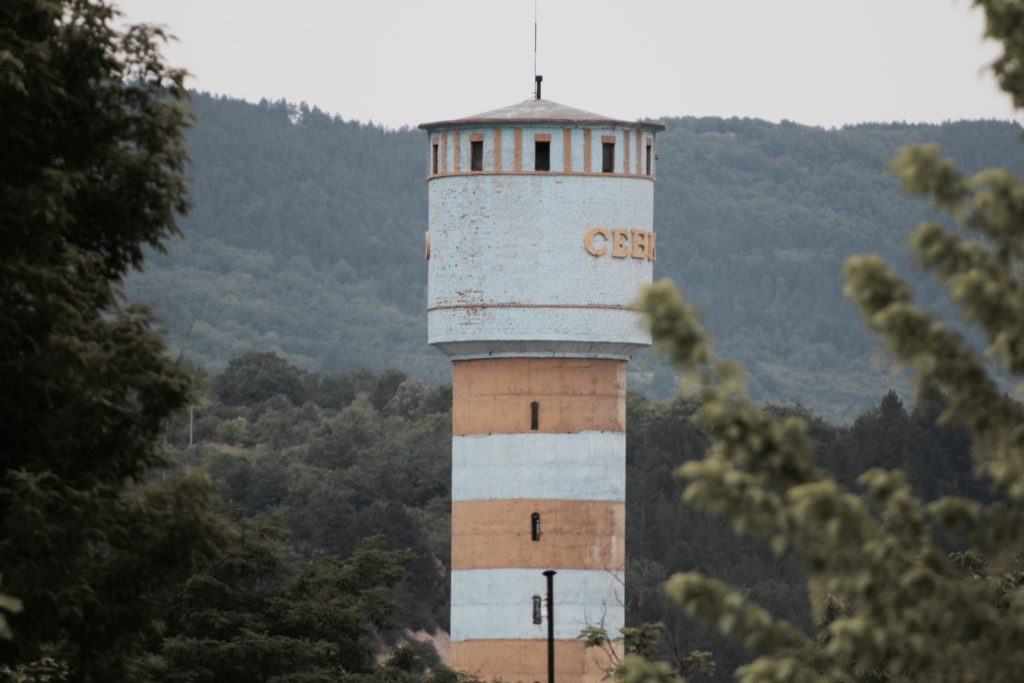By Yaldaz Sadakova

Sevlievo, Bulgaria. Photo by Yaldaz Sadakova.
When people hear my accent, they often ask where I’m from.
If I had to make a list of Annoying Frequently Asked Questions, “Where are you from?” would be near the top.
By the way, many of those who ask me are immigrants like myself.
Let’s abolish the myth that only non-immigrants ask “Where are you from?” because they want to stereotype you or to question your right to be in their country.
Here’s the most common reaction I encounter.
As soon as I answer that I’m from Bulgaria, the person’s eyes glaze over. Their expression becomes blank.
Then, mild panic mixed with embarrassment creeps into their eyes.
I can see what they’re thinking.
Bul-what?! Where the hell is that? She didn’t say Bavaria, did she? That’s not a country. Anyway, I can’t show that I don’t know where her country is. That will make me look like an idiot, and I’m actually a pretty informed person!
I don’t like this woman for making me feel like an idiot. How dare she come from Bul-whatever-the-fuck-it-is? Why can’t she come from some well-known country I can talk about?
Of course, they don’t say any of that.
Instead, they respond with “interesting.”
But I can tell from their eyes and tone that they’re not in the least bit interested.
Then they try to change the subject.
The more rare scenario is for the person to ask me a follow-up question about Bulgaria, like where it is or what it’s known for.
I don’t mind that follow-up question because the person shows curiosity and a desire to engage with me. I prefer that to the vacant expression.
“I’m sorry, but my geography is really bad. Where exactly is Bulgaria?” a woman asked me recently.
So I explained. It’s in Southeastern Europe, north of Turkey and Greece, south of Romania, on the Black Sea.
I respected the fact that this woman showed both curiosity and vulnerability instead of hiding her ignorance with indifference.
I don’t get offended when people don’t know where my obscure home country is. I’m embarrassed to admit this, but there are many countries I can’t place on the map.
Wrong Assumptions
When I tell people I’m from Bulgaria, they usually assume I’m ethnically Bulgarian.
I am not, even though I was born and raised there.
But I don’t get into those details because I have a complicated relationship with my ethnicity. And because to a large extent I do feel Bulgarian.
Still, having grown up as a Turkish Muslim person in an Islamophobic predominantly Christian country has definitely influenced my perceptions—although I don’t practice Islam (or any other religion), and although I’ve largely forgotten Turkish, my mother tongue.
But the rigidity of “Where are you from?” isn’t conducive to discussing these dimensions. The question squeezes out the narratives of those who have complex ethnic, racial, religious or cultural identities.
Here’s another assumption people make when I say I’m from Bulgaria. They assume I came to Canada, where I now live, straight from Bulgaria.
Which is why it’s my journey after Bulgaria that will tell you more about me than the fact that I’m from Bulgaria. Specifically, from a small, backwater town in a valley called Sevlievo.
And that’s my other problem with the “Where are you from?” question. It doesn’t address where you’ve been and how you’ve grown; only where you started, where you were born.
The question doesn’t allow room for the experiences of those of us who have lived in multiple countries and cities—and, therefore, have ties to different geographies.
Of course, my country of birth is still a home (of sorts) to me.
Whenever I visit, everything is familiar and full of memories.
The abundant nature and the mountains.
The stray dogs and cats.
The forbidding Soviet-style concrete buildings.
The small apartment I grew up in.
But I see it all in sepia tones, as a faded landscape that was relevant to who I was years ago.
My home country no longer provides me with all the reference points I need to understand the world.
It no longer feels like my one and only home, my intellectual and emotional anchor in the world.
Yet, that’s what people usually assume when I say I’m from Bulgaria: that what defines me is my Bulgarian nationality; that my points of reference are Bulgarian.
That’s not true.
I rarely read in Bulgarian.
I don’t follow Bulgarian news.
I don’t vote in Bulgarian elections.
I don’t eat Bulgarian foods.
I don’t practice any Bulgarian customs.
I don’t specifically seek out Bulgarian immigrants to socialize with.
I don’t find Bulgarians easier to bond with than non-Bulgarians.
That’s why I prefer to talk about where I’ve been, not where I’m from.
Which brings me to writer Taiye Selasi’s brilliant idea.
A Better Question
Selasi says we should replace “Where are you from?” with “Where are you a local?”
The answer to this new question would give us a fuller picture about the person, she argues in a TED talk.
Unlike the “Where are you from?” question, “Where are you a local?” begins to address the experiences of people like me, who have special ties to multiple places because they’ve lived there.
Multi-local people is Selasi’s term for us.
Selasi says that in her case, it’s not accurate to say she’s from the United States or Ghana.
“I have no relationship with the United States, all 50 of them, not really.
“My relationship is with Brookline, the town where I grew up; with New York City, where I started work; with Lawrenceville, where I spend Thanksgiving.
“What makes America home for me is not my passport or accent, but these very particular experiences and the places they occur.
“Despite my pride in Ewe culture, the Black Stars, and my love of Ghanaian food, I’ve never had a relationship with the Republic of Ghana, writ large.
“My relationship is with Accra, where my mother lives, where I go each year, with the little garden in Dzorwulu, where my father and I talk for hours.
“These are the places that shape my experience. My experience is where I’m from.”
I love the last sentence. “My experience is where I’m from.”
Selasi says “Where are you a local?” is a better question not because of its specificity, but its intention.
It asks us to focus on where a person’s real life happens and steers us away from national stereotypes.
“As a unit of measurement for human experience, the country doesn’t quite work.
“That’s why [my friend] Olu says, ‘I’m German, but my parents come from Nigeria.’ The ‘but’ in that sentence belies the inflexibility of the units, one fixed and fictional entity bumping up against another.
“‘I’m a local of Lagos and Berlin,’ suggests overlapping experiences, layers that merge together, that can’t be denied or removed. You can take away my passport, but you can’t take away my experience. That I carry within me.”
How to Map Your Locality

Sevlievo, Bulgaria. Photo by Yaldaz Sadakova.
Selasi proposes a three-step test to determine all the places where you’re a local.
The first step is defining your daily rituals, like making breakfast and commuting.
“What kind of rituals are these? Where do they occur? In what city or cities in the world do shopkeepers know your face?
“As a child, I carried out fairly standard suburban rituals in Boston, with adjustments made for the rituals my mother brought from London and Lagos. We took off our shoes in the house, we were unfailingly polite with our elders, we ate slow-cooked spicy food.
“In snowy North America, ours were rituals of the global South. The first time I went to Delhi or to the southern parts of Italy, I was shocked by how at home I felt. The rituals were familiar.”
Here’s one of my daily rituals.
I listen to BBC World every morning while I make my breakfast of almond butter toast and black coffee.
Even though I live in the Toronto area, I don’t listen to local or Canadian news. I find its narrow, Canada-is-the-center-of-the-universe outlook stifling.
And, like I said, I feel no need to follow Bulgarian news, because that, too, is limiting to me.
I want to know what’s happening around the world.
Whenever a segment about the EU comes up on the news, as is often the case, I have a visceral reaction.
It’s because I used to live in Brussels, where I reported on EU affairs as a journalist. So anything that has to do with Brussels and Europe in general interests me.
After I listen to the news, I do my Morning Pages—three pages of stream-of-consciousness writing. It’s a practice writer Julia Cameron came up with.
Sometime later in the day, I do my vipassana meditation.
Just like my news and Morning Pages ritual, my meditation practice has nothing to do with my Bulgarianness or my Turkishness.
Even though many people’s daily rituals are tied to their heritage, my rituals are not.
The second step Selasi suggests for determining where you are a local is defining your relationships.
“To whom do you speak at least once a week, be it face to face or on FaceTime? Be reasonable in your assessment; I’m not talking about your Facebook friends. I’m speaking of the people who shape your weekly emotional experience.
“My mother in Accra, my twin sister in Boston, my best friends in New York: these relationships are home for me.”
The people I talk to at least once a week are my mom back in Bulgaria and my boyfriend here. These two people shape my emotional experience.
The third step Selasi suggests in determining your locality is defining your restrictions.
“We’re local where we carry out our rituals and relationships, but how we experience our locality depends in part on our restrictions.
“By restrictions, I mean, where are you able to live? What passport do you hold? Are you restricted by, say, racism, from feeling fully at home where you live? By civil war, dysfunctional governance, economic inflation, from living in the locality where you had your rituals as a child?”
In terms of restrictions, I have a Bulgarian passport, which means I can’t live in my favorite city: New York.
It’s because of my Bulgarian passport that I had to leave New York 11 years ago.
My American visa expired, and I couldn’t find a company willing to sponsor me for a new one.
In fact, a job offer I received in New York at that time was withdrawn once the employer learned he’d have to sponsor me.
So I’m very conscious of how your passport can restrict you.
But my Bulgarian passport isn’t bad. It does allow me to travel, live and work without a visa throughout the EU.
A Bulgarian passport didn’t always come with these privileges, though.
Before Bulgaria joined the EU in 2007, the Bulgarian passport was incredibly restrictive, the way the passports of all poor countries are.
And even when Bulgaria did join the EU, Bulgarian citizens weren’t allowed to work throughout the union without a permit. That privilege came only seven years later.
So I do appreciate all the newly acquired rights and freedoms that come with my EU passport, although I live in Toronto.
Actually, I live in the suburbs of Toronto. Not because I love suburban life. No, I’m a city person.
I’m here for other reasons, one of which is that I can’t afford to live in the city. Money is another restriction for me.
I do, however, have the privilege of Canadian citizenship.
I wasn’t born in Canada, so for me this is not an inherited privilege. It’s a privilege I had to work for, a privilege I acquired only recently.
But now I have the same rights as those who were born here.
I don’t need an employer to sponsor me in order for me to stay in the country, the way I did back in New York.
Even though my Canadian passport means that on paper I’m equal to Canadian-born people, the reality is different.
I do experience discrimination when it comes to finding a job in my field because of my foreign name, foreign accent and the fact that most of my work experience comes from outside Canada.
Also, it has been well-documented that immigrant women like me make less money than Canadian-born men and women.
And my Canadian passport doesn’t allow me to live and work in my beloved New York. It does, however, allow me to visit without a visa.
But despite all the restrictions I face, it’s important to note that I benefit from white privilege.
All of these experiential nuances can be captured by Selasi’s locality test.
In plain English—for example, if you’re talking to someone at a party—her locality question translates to questions such as, “Where do you live?”, “Where did you live before?” and “What restrictions are you subject to?”
So yeah…I can say I’m from Bulgaria, and that won’t reveal much about me.
Or, I can say I now live in the Toronto suburb of Whitby. And before that I lived in Sevlievo, Blagoevgrad, New York, Sofia, Brussels and Toronto.
I’m a local of all these places.
What about you?
Where do you live now?
What are your rituals, relationships and restrictions?
Where did you live before? ♦
ALSO READ:

